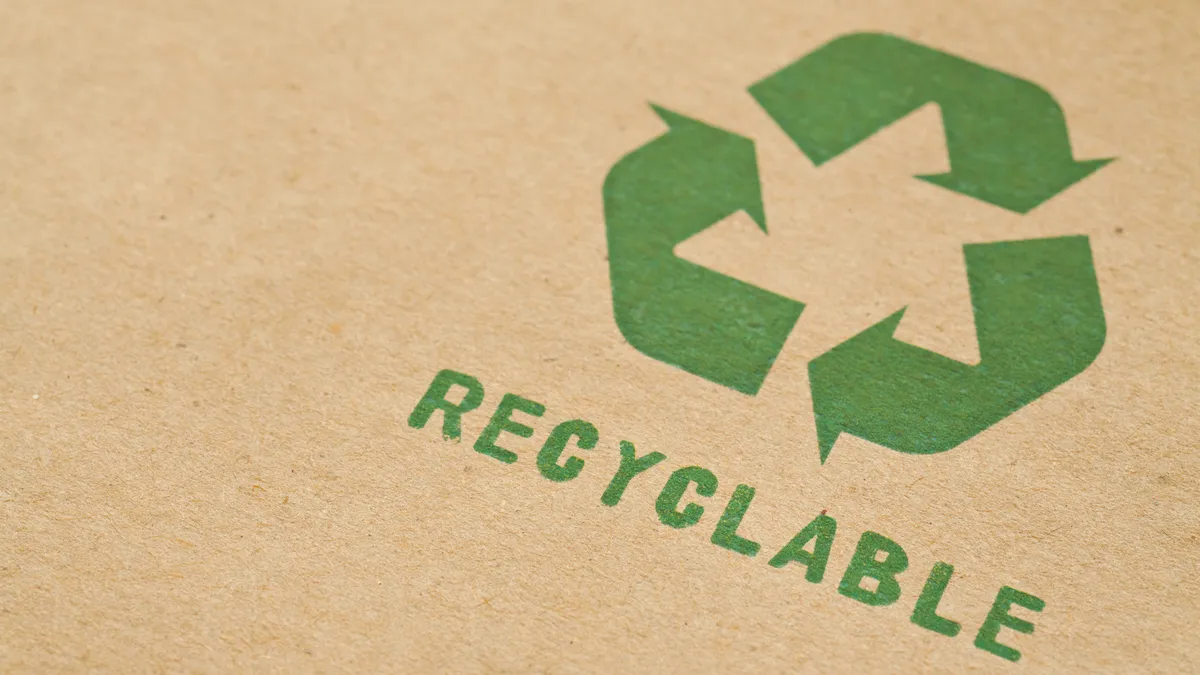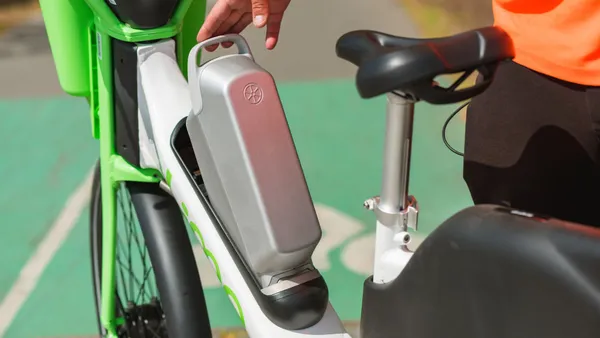Dive Brief:
- A federal truth in labeling bill is being drafted by Sen. Jeff Merkley, D-Ore., as revealed in a June 14 response letter from packaging trade group Ameripen that was obtained by and published by Politico. It’s an idea some packaging producers support as long as any new federal standards would preempt similar state laws such as California’s.
- The letter suggests the draft bill aims to create federal labeling standards for when and how items like beverage containers, packaging and food service items can be labeled recyclable, compostable or reusable. The bill has not been introduced, but the draft was sent to numerous industry and environmental groups for feedback.
- The bill does not call for the federal law to preempt similar state laws. Ameripen said in the letter it feels “very strongly” that adding a preemption clause would reduce confusion by creating a uniform set of national labeling standards. That could conflict with California’s truth in labeling law that laid out strict standards for environmental claims on plastic packaging when it passed in 2021.
Dive Insight:
Those sources familiar with the bill said the draft bill highlights consumers’ interest in seeing clearer labeling on packaging. They said it also spotlights tensions over what combination of provisions would best limit confusion while also increasing recycling rates.
Merkley’s federal truth in labeling bill draft, first reported by Politico’s E&E News, calls for prohibiting non-recyclable packaging from bearing a chasing arrow symbol and setting federal definitions for “recyclable,” “compostable” and “reusable,” according to Ameripen’s review. It would also require plastic packaging to bear a resin code 1-7 without using a chasing arrows symbol surrounding that code. Ameripen argues that provision should only apply to non-recyclable plastics.
Another proposed provision would give the U.S. EPA jurisdiction to regulate recyclability claims, but said the Federal Trade Commission would also play a role in regulating claims in advertisements. Ameripen said the draft bill may give too much authority to the EPA and calls for a third-party certification system for evaluating packaging claims.
The Federal Trade Commission is responsible for the Green Guides, guidance on the environmental marketing claims companies can make about their products or packaging. The FTC is in the process of updating the Green Guides, which some recycling and packaging groups say are outdated and don’t reflect the realities of today’s products, markets and recycling systems.
Ameripen emphasized that a federal truth in labeling bill should be able to supersede state efforts. “By enacting federal definitions for recyclable, compostable, and reusable packaging, Congress could streamline compliance for businesses and provide clarity for consumers nationwide,” the letter said.
A preemption provision could conflict with California’s SB 343, the truth in labeling law passed in 2021 that prohibits the use of a “chasing arrows” symbol or any other recyclability claim on packaging unless it meets certain state thresholds for recycling collection and processing.
The National Stewardship Action Council, a sponsor of SB 343, also received a copy of the draft bill. Executive Director Heidi Sanborn did not comment on the draft, saying she had not yet reviewed the language, but clarified that NSAC would not support “any attempt” to preempt California’s law, whether that attempt came from a version of this draft legislation or another type of bill.
Several environmental and state groups who were sent Merkley’s bill draft declined to comment directly on the legislation, saying the discussions were in early stages and that the version of the bill eventually introduced to Congress might look very different than the one that has been circulating. Ameripen’s letter indicated it was providing comments on a second draft of the bill.
Alex Bertolucci, a natural resource specialist with the Oregon Department of Environmental Quality, did not comment directly on Merkley’s bill draft or any possible effects a national bill could have on Oregon. In an email, he said some type of federal labeling law “would be significant for consumers nationwide who are often confused and misled about what can and can't be recycled.”
Oregon passed an extended producer responsibility for packaging law in 2021 that included numerous provisions, including convening a truth in labeling task force meant to “study and evaluate misleading or confusing claims” about whether certain products are recyclable.
The task force completed a report of its findings for the state legislature in 2022, which called for legislation addressing confusing labeling on packaging sold in the state, standardizing language on the labels and coordinating recycling acceptance guidelines with other states like California.
“There is broad support for improving how we label and communicate about recyclability to consumers,” Bertolucci said in the email.
Oregon is also keeping a close eye on how California implements SB 343. “Many distribution networks servicing California also service Oregon. From this, consumers in Oregon can expect fewer items labeled with the chasing arrows or recyclability claims on non-recyclable products or packaging,” he said.
California and Oregon have different recycling rules, meaning there could be instances where California allows a recycling symbol on a certain kind of packaging not accepted in Oregon’s recycling system. “However, in many cases, California's effective implementation of SB 343 should reduce misleading or confusing claims on items sold in Oregon.”















